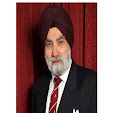Khalsa Aid 21st Century
“Sikh social activism” is part heading of Prof. Nirmal Singh of USA’s article in the UK SGGS 300 commemorative publication, “One Guide & One Path”.
Khalsa Aid is “Sikh social activism” in its most extrovert and non-discriminatory form. I have already written about extrovert Sikhi sewa of Khalsa Aid (organisation) on a number of occasions and extracts from this article have been published elsewhere to mark ten years of this ongoing project by enterprising young Sikhs.
Ex Prime Minister Tony Blair mentioned Khalsa Aid as one of those great humanitarian enterprises “which draw inspiration from the teachings of the different faiths. ('Faith and Globalisation' lecture Thursday 3rd April 2008 - see Khalsa Aid website www.khalsaaid.org )
It was at a prize giving function of Slough Sikh school (attached to the Gurdwara sahib) ten years ago, that I heard Ravinder Singh (Ravi), a leading founder of Khalsa Aid. The children sat mesmerized, and so did the invited guests, as Ravi recited the first risky Khalsa Aid mission to Albania, helping Kosovan refugees. The immediate thought in my mind was that this was the sort of initiative which would inspire young Sikhs to extrovert seva combining it with adventure and education about global communities. Gurdwaras are the starting schools for learning about seva by serving the sangat. However, supported by Gurdwaras, this seva should reach out to global communities most in need. That would be in true Sikhee spirit and also promote Sikh ideology and identity. That is precisely what Khalsa Aid has aimed for over the last ten years.
Khalsa Aid teams have ventured into may parts of the world in need of humanitarian assistance since the formation of the charity in 1999, the auspicious year celebrating 300th anniversary of the Khalsa. The initiative has wide support. It is much appreciated by the Sikh diaspora as a model for selfless sewa without any form of discrimination. The first mission in 1999 was to provide food and shelter to the refugees on the Albanian/Yugoslavia border where thousands of victims of the war in Yugoslavia were taking shelter. Since then humanitarian aid has been provided to suffering communities in Turkey (1999 earthquake victims); in India, Orissa (2000 cyclone) and Gujarat (2001 earthquake); Congo (2002 volcanic eruption) and many other projects abroad. (Some will remember Ravinder Singh’s interesting e-mails from Somalia when he was there on an aid mission some years ago.)
I wrote about the Khalsa Aid mission to Kabul in 2004. That is a country where few would dare to venture. Amrik Singh of Heathrow Sikh Care Society and Bherminder Singh of Slough made up the field team. Khalsa Aid’s mission into Afghanistan was to assess the situation of the minority communities in Kabul and identify their immediate needs which Khalsa Aid could address. Due to limited resources and time, the mission was restricted to Kabul. There are very few Christian and hardly any Jewish communities left in Kabul; only a few hundred Sikh and Hindu families are left in a state of despair.
Part of the debriefing provided to an attentive Khalsa Aid meeting at Slough (UK) on Sunday, 20 June 2004, was a video. The Kabul Sangat listened to the stage secretary with much appreciation as he thanked the visiting Khalsa Aid workers, Amrik Singh and Bherminder Singh, towards the end of their visit. This visit from two dedicated UK Gursikhs was a ray of hope for the Sikh and Hindu communities in Kabul, who have suffered much in the last few years. The support the Khalsa Aid was able to provide was received gratefully by both, the Sikh and the Hindu communities. The hardships of Afghanistani Sikhs and Hindus continue unabated.
It may be argued that“Khalsa Aid” goes back in time to at least Bhai Ghanayiya if not right back to the foundation of Guru Nanak Sahib’s mission over 500 years ago. The Guru’s Sikh has always gone to the aid of anyone in need without any discrimination whatsoever. That is one of the founding concepts of Sikhi. Selfless, non-discriminatory service in humility (seva) is a pre-condition to ultimate salvation (“Wich dunia sev kamayiay. Tan dargeh baisan paayiyay. Guru Nanak Sahib - SGGS p. 26)
Khalsa Aid website (www.khalsaaid.com) lists numerous aid missions to countries around the globe. A recent communication from Ravi described many Khalsa Aid projects in progress “so that the real needy and disaster/war victims can benefit from Sarbat Da Bhalla.” As usual, the limiting factor is funding and volunteers.
In conclusion, I am content to quote Prof Nirmal Singh, “We can recall our acts of social responsibility a million times in our Ardaas – it will not enable us to engage effectively in causes that are of importance in today’s context. That ability will only be enhanced if we talk about what is impeding us presently to become more engaged and involved as a faith group. Once we are able to think through I have no doubt we would succeed in repositioning ourselves as concerned social activists very quickly and effectively.”
Young Sikhs graduate from the institution of the Gurdwara in the related subjects of Simran and sewa. Following graduation, teams of Sikh sevadars should provide relief anywhere in the world, where most needed, while promoting Sikh ideology and identity at the same time. “Khalsa Aid” mission deserves full support from Gurdwars and sangats as continuation of the Sikh sewa tradition.
Gurmukh Singh (UK)
E-mail: sewauk2005@yahoo.co.uk
Subscribe to:
Post Comments (Atom)

No comments:
Post a Comment